Management Communication Report: Exploring Interpersonal Dynamics
VerifiedAdded on 2023/06/11
|9
|1958
|147
Report
AI Summary
This report explores the interpersonal aspects of communication within organizations, focusing on the concept of persuasion. It defines interpersonal communication as the exchange of verbal and non-verbal messages, emphasizing its importance in face-to-face interactions. The report highlights the significance of persuasion and influence as essential skills for managers and leaders to effectively implement changes, enhance employee performance, and achieve organizational goals. It also discusses how interpersonal communication, with its feedback mechanisms, ensures that messages are properly understood, contributing to enhanced organizational performance and profitability. Desklib offers a wide range of study tools and resources for students.
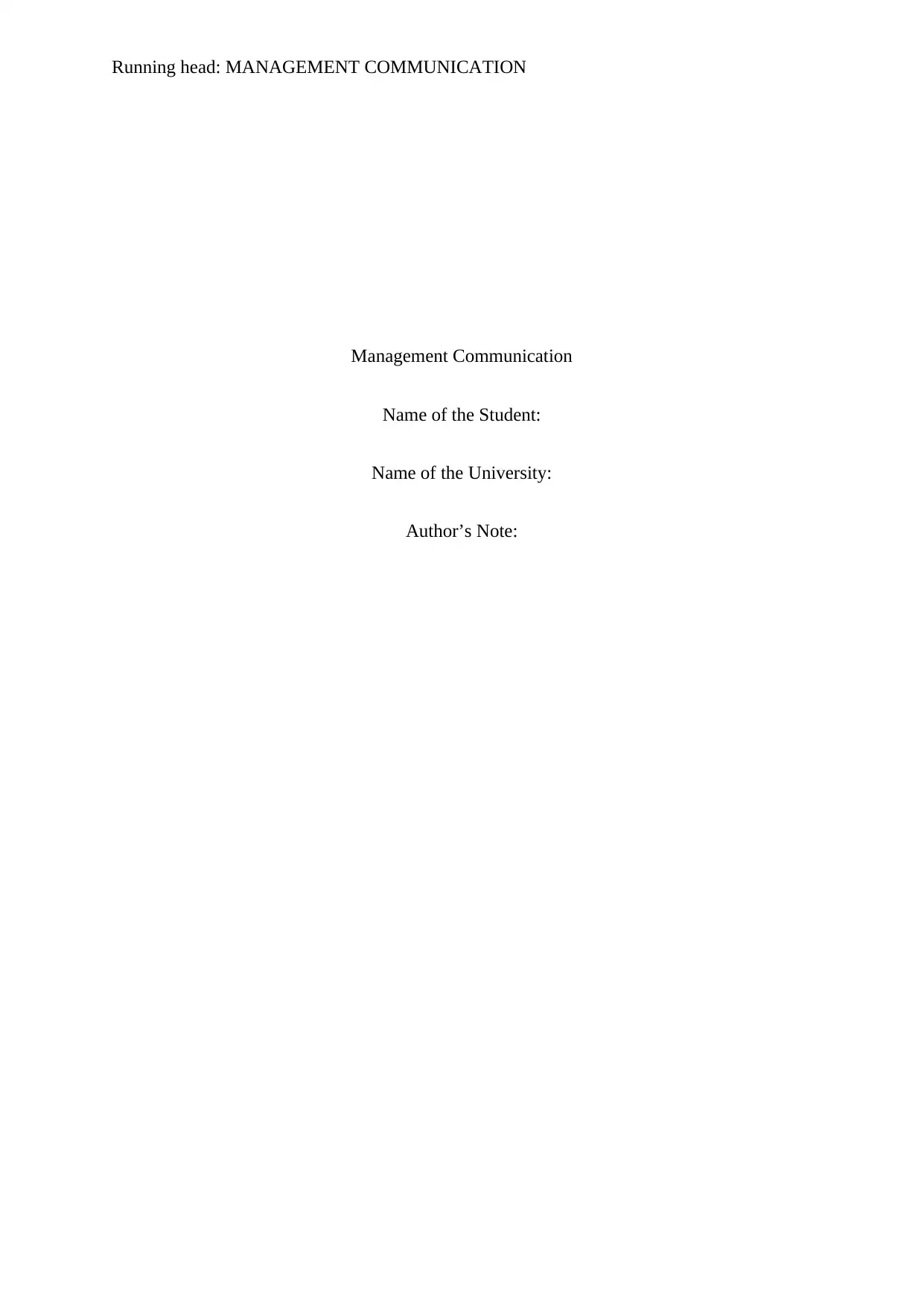
Running head: MANAGEMENT COMMUNICATION
Management Communication
Name of the Student:
Name of the University:
Author’s Note:
Management Communication
Name of the Student:
Name of the University:
Author’s Note:
Paraphrase This Document
Need a fresh take? Get an instant paraphrase of this document with our AI Paraphraser
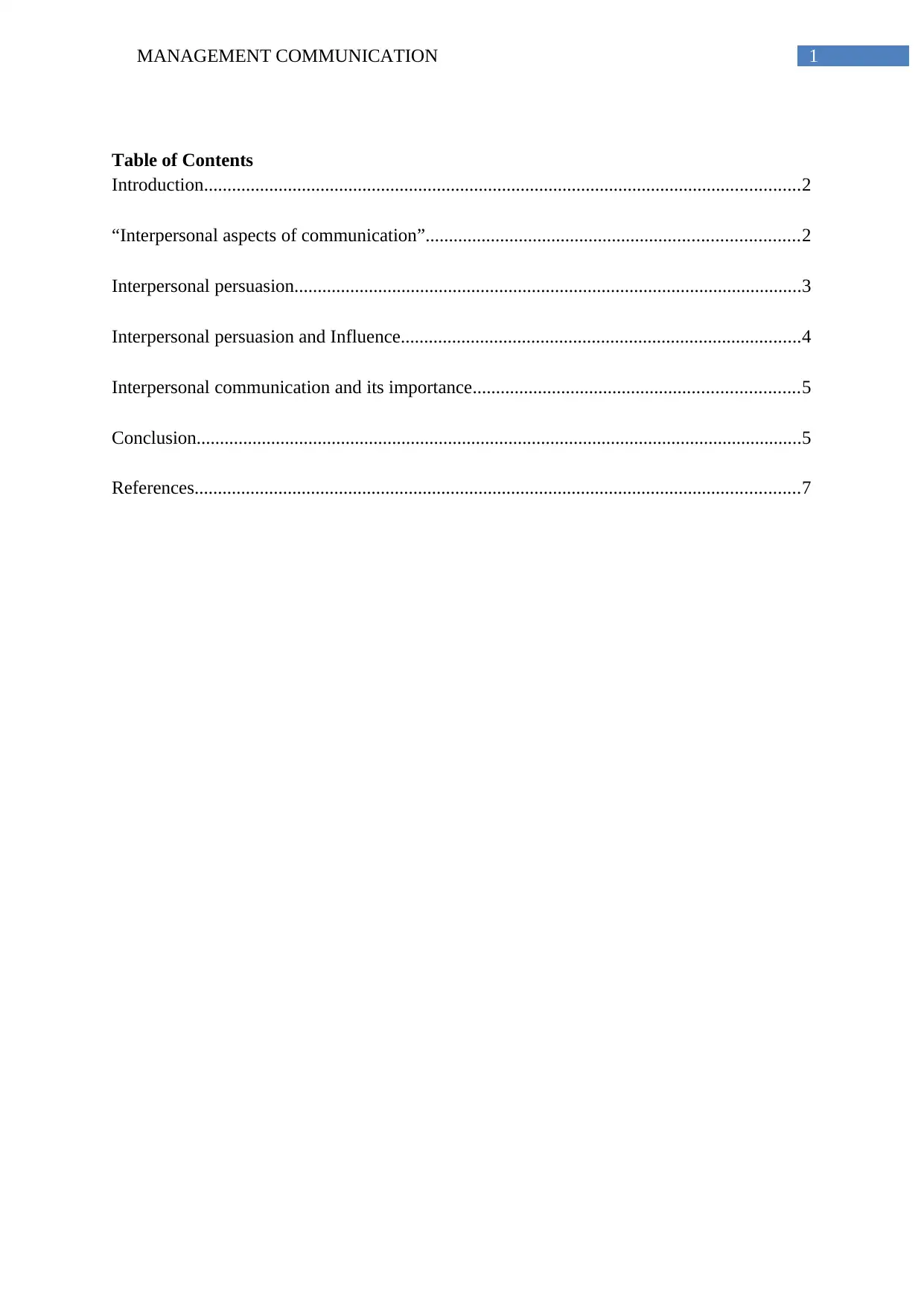
1MANAGEMENT COMMUNICATION
Table of Contents
Introduction................................................................................................................................2
“Interpersonal aspects of communication”................................................................................2
Interpersonal persuasion.............................................................................................................3
Interpersonal persuasion and Influence......................................................................................4
Interpersonal communication and its importance......................................................................5
Conclusion..................................................................................................................................5
References..................................................................................................................................7
Table of Contents
Introduction................................................................................................................................2
“Interpersonal aspects of communication”................................................................................2
Interpersonal persuasion.............................................................................................................3
Interpersonal persuasion and Influence......................................................................................4
Interpersonal communication and its importance......................................................................5
Conclusion..................................................................................................................................5
References..................................................................................................................................7
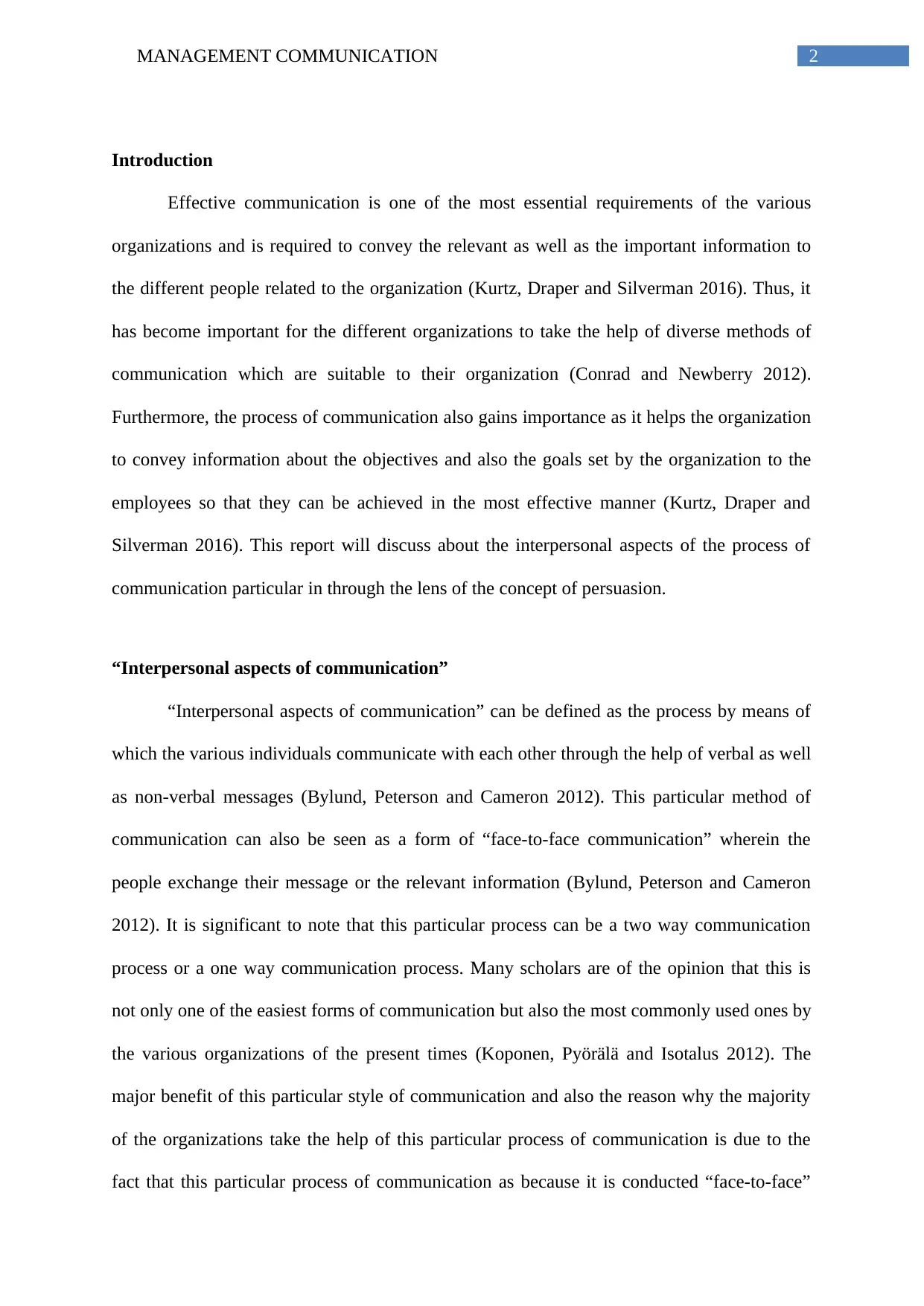
2MANAGEMENT COMMUNICATION
Introduction
Effective communication is one of the most essential requirements of the various
organizations and is required to convey the relevant as well as the important information to
the different people related to the organization (Kurtz, Draper and Silverman 2016). Thus, it
has become important for the different organizations to take the help of diverse methods of
communication which are suitable to their organization (Conrad and Newberry 2012).
Furthermore, the process of communication also gains importance as it helps the organization
to convey information about the objectives and also the goals set by the organization to the
employees so that they can be achieved in the most effective manner (Kurtz, Draper and
Silverman 2016). This report will discuss about the interpersonal aspects of the process of
communication particular in through the lens of the concept of persuasion.
“Interpersonal aspects of communication”
“Interpersonal aspects of communication” can be defined as the process by means of
which the various individuals communicate with each other through the help of verbal as well
as non-verbal messages (Bylund, Peterson and Cameron 2012). This particular method of
communication can also be seen as a form of “face-to-face communication” wherein the
people exchange their message or the relevant information (Bylund, Peterson and Cameron
2012). It is significant to note that this particular process can be a two way communication
process or a one way communication process. Many scholars are of the opinion that this is
not only one of the easiest forms of communication but also the most commonly used ones by
the various organizations of the present times (Koponen, Pyörälä and Isotalus 2012). The
major benefit of this particular style of communication and also the reason why the majority
of the organizations take the help of this particular process of communication is due to the
fact that this particular process of communication as because it is conducted “face-to-face”
Introduction
Effective communication is one of the most essential requirements of the various
organizations and is required to convey the relevant as well as the important information to
the different people related to the organization (Kurtz, Draper and Silverman 2016). Thus, it
has become important for the different organizations to take the help of diverse methods of
communication which are suitable to their organization (Conrad and Newberry 2012).
Furthermore, the process of communication also gains importance as it helps the organization
to convey information about the objectives and also the goals set by the organization to the
employees so that they can be achieved in the most effective manner (Kurtz, Draper and
Silverman 2016). This report will discuss about the interpersonal aspects of the process of
communication particular in through the lens of the concept of persuasion.
“Interpersonal aspects of communication”
“Interpersonal aspects of communication” can be defined as the process by means of
which the various individuals communicate with each other through the help of verbal as well
as non-verbal messages (Bylund, Peterson and Cameron 2012). This particular method of
communication can also be seen as a form of “face-to-face communication” wherein the
people exchange their message or the relevant information (Bylund, Peterson and Cameron
2012). It is significant to note that this particular process can be a two way communication
process or a one way communication process. Many scholars are of the opinion that this is
not only one of the easiest forms of communication but also the most commonly used ones by
the various organizations of the present times (Koponen, Pyörälä and Isotalus 2012). The
major benefit of this particular style of communication and also the reason why the majority
of the organizations take the help of this particular process of communication is due to the
fact that this particular process of communication as because it is conducted “face-to-face”
⊘ This is a preview!⊘
Do you want full access?
Subscribe today to unlock all pages.

Trusted by 1+ million students worldwide
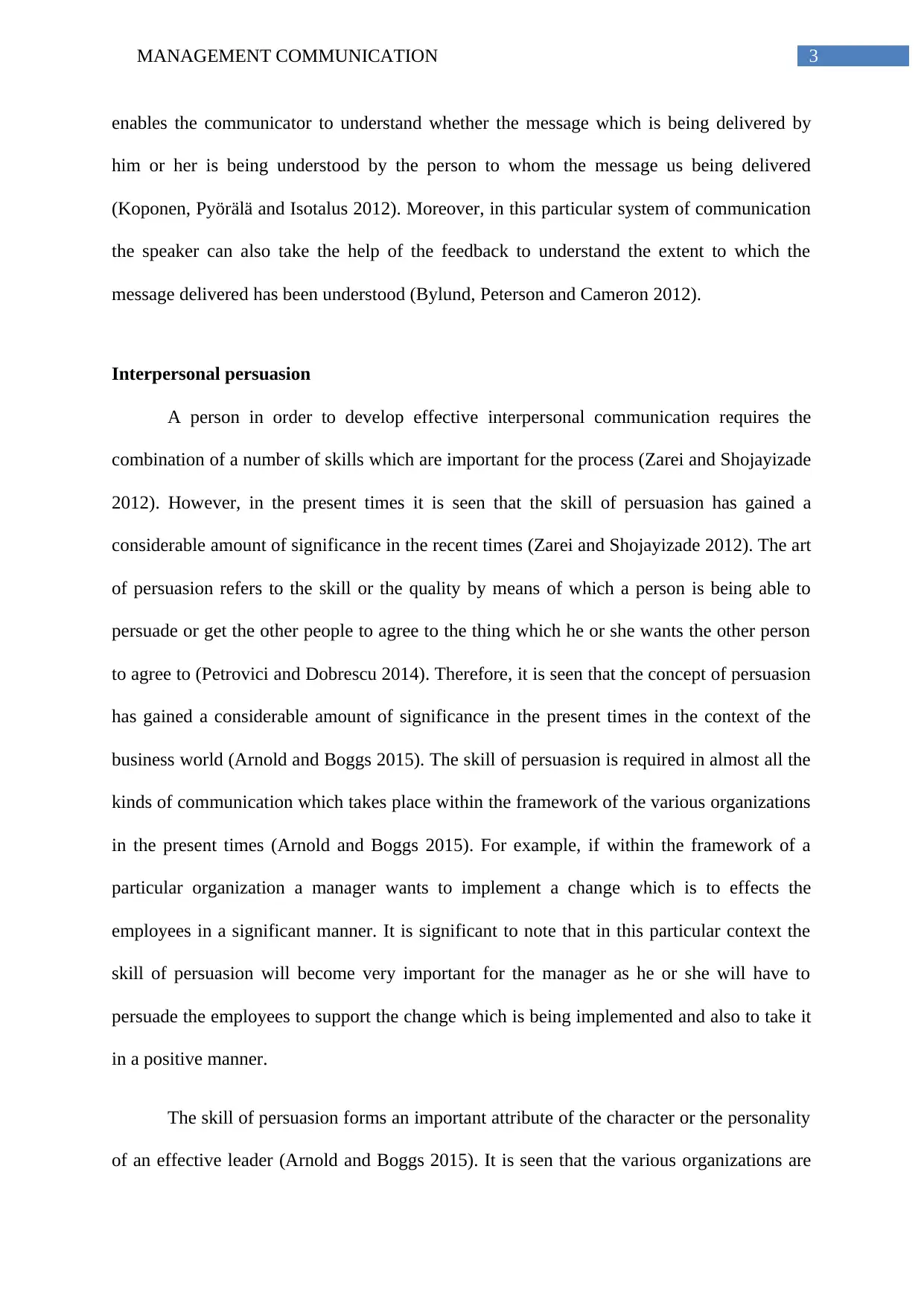
3MANAGEMENT COMMUNICATION
enables the communicator to understand whether the message which is being delivered by
him or her is being understood by the person to whom the message us being delivered
(Koponen, Pyörälä and Isotalus 2012). Moreover, in this particular system of communication
the speaker can also take the help of the feedback to understand the extent to which the
message delivered has been understood (Bylund, Peterson and Cameron 2012).
Interpersonal persuasion
A person in order to develop effective interpersonal communication requires the
combination of a number of skills which are important for the process (Zarei and Shojayizade
2012). However, in the present times it is seen that the skill of persuasion has gained a
considerable amount of significance in the recent times (Zarei and Shojayizade 2012). The art
of persuasion refers to the skill or the quality by means of which a person is being able to
persuade or get the other people to agree to the thing which he or she wants the other person
to agree to (Petrovici and Dobrescu 2014). Therefore, it is seen that the concept of persuasion
has gained a considerable amount of significance in the present times in the context of the
business world (Arnold and Boggs 2015). The skill of persuasion is required in almost all the
kinds of communication which takes place within the framework of the various organizations
in the present times (Arnold and Boggs 2015). For example, if within the framework of a
particular organization a manager wants to implement a change which is to effects the
employees in a significant manner. It is significant to note that in this particular context the
skill of persuasion will become very important for the manager as he or she will have to
persuade the employees to support the change which is being implemented and also to take it
in a positive manner.
The skill of persuasion forms an important attribute of the character or the personality
of an effective leader (Arnold and Boggs 2015). It is seen that the various organizations are
enables the communicator to understand whether the message which is being delivered by
him or her is being understood by the person to whom the message us being delivered
(Koponen, Pyörälä and Isotalus 2012). Moreover, in this particular system of communication
the speaker can also take the help of the feedback to understand the extent to which the
message delivered has been understood (Bylund, Peterson and Cameron 2012).
Interpersonal persuasion
A person in order to develop effective interpersonal communication requires the
combination of a number of skills which are important for the process (Zarei and Shojayizade
2012). However, in the present times it is seen that the skill of persuasion has gained a
considerable amount of significance in the recent times (Zarei and Shojayizade 2012). The art
of persuasion refers to the skill or the quality by means of which a person is being able to
persuade or get the other people to agree to the thing which he or she wants the other person
to agree to (Petrovici and Dobrescu 2014). Therefore, it is seen that the concept of persuasion
has gained a considerable amount of significance in the present times in the context of the
business world (Arnold and Boggs 2015). The skill of persuasion is required in almost all the
kinds of communication which takes place within the framework of the various organizations
in the present times (Arnold and Boggs 2015). For example, if within the framework of a
particular organization a manager wants to implement a change which is to effects the
employees in a significant manner. It is significant to note that in this particular context the
skill of persuasion will become very important for the manager as he or she will have to
persuade the employees to support the change which is being implemented and also to take it
in a positive manner.
The skill of persuasion forms an important attribute of the character or the personality
of an effective leader (Arnold and Boggs 2015). It is seen that the various organizations are
Paraphrase This Document
Need a fresh take? Get an instant paraphrase of this document with our AI Paraphraser
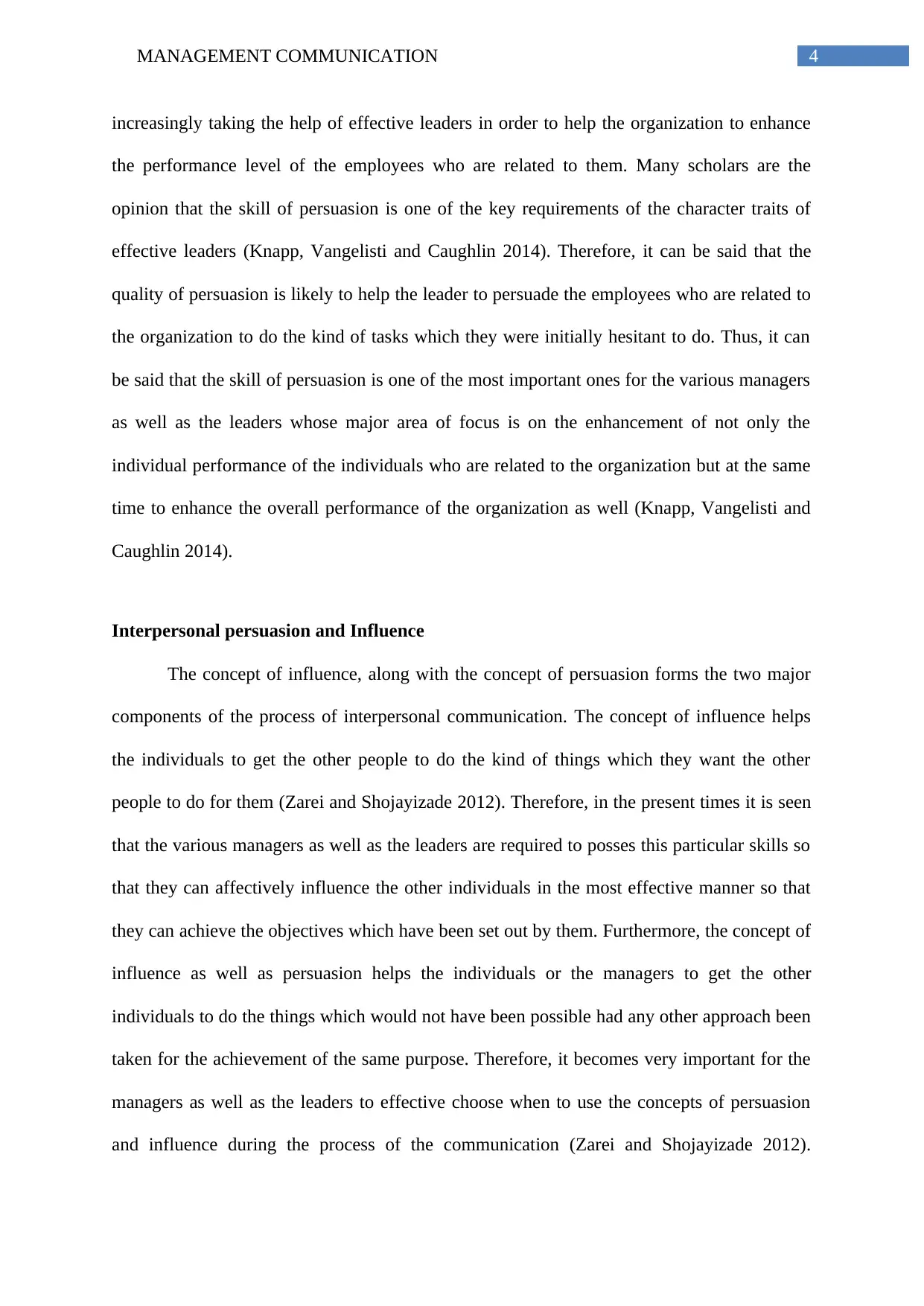
4MANAGEMENT COMMUNICATION
increasingly taking the help of effective leaders in order to help the organization to enhance
the performance level of the employees who are related to them. Many scholars are the
opinion that the skill of persuasion is one of the key requirements of the character traits of
effective leaders (Knapp, Vangelisti and Caughlin 2014). Therefore, it can be said that the
quality of persuasion is likely to help the leader to persuade the employees who are related to
the organization to do the kind of tasks which they were initially hesitant to do. Thus, it can
be said that the skill of persuasion is one of the most important ones for the various managers
as well as the leaders whose major area of focus is on the enhancement of not only the
individual performance of the individuals who are related to the organization but at the same
time to enhance the overall performance of the organization as well (Knapp, Vangelisti and
Caughlin 2014).
Interpersonal persuasion and Influence
The concept of influence, along with the concept of persuasion forms the two major
components of the process of interpersonal communication. The concept of influence helps
the individuals to get the other people to do the kind of things which they want the other
people to do for them (Zarei and Shojayizade 2012). Therefore, in the present times it is seen
that the various managers as well as the leaders are required to posses this particular skills so
that they can affectively influence the other individuals in the most effective manner so that
they can achieve the objectives which have been set out by them. Furthermore, the concept of
influence as well as persuasion helps the individuals or the managers to get the other
individuals to do the things which would not have been possible had any other approach been
taken for the achievement of the same purpose. Therefore, it becomes very important for the
managers as well as the leaders to effective choose when to use the concepts of persuasion
and influence during the process of the communication (Zarei and Shojayizade 2012).
increasingly taking the help of effective leaders in order to help the organization to enhance
the performance level of the employees who are related to them. Many scholars are the
opinion that the skill of persuasion is one of the key requirements of the character traits of
effective leaders (Knapp, Vangelisti and Caughlin 2014). Therefore, it can be said that the
quality of persuasion is likely to help the leader to persuade the employees who are related to
the organization to do the kind of tasks which they were initially hesitant to do. Thus, it can
be said that the skill of persuasion is one of the most important ones for the various managers
as well as the leaders whose major area of focus is on the enhancement of not only the
individual performance of the individuals who are related to the organization but at the same
time to enhance the overall performance of the organization as well (Knapp, Vangelisti and
Caughlin 2014).
Interpersonal persuasion and Influence
The concept of influence, along with the concept of persuasion forms the two major
components of the process of interpersonal communication. The concept of influence helps
the individuals to get the other people to do the kind of things which they want the other
people to do for them (Zarei and Shojayizade 2012). Therefore, in the present times it is seen
that the various managers as well as the leaders are required to posses this particular skills so
that they can affectively influence the other individuals in the most effective manner so that
they can achieve the objectives which have been set out by them. Furthermore, the concept of
influence as well as persuasion helps the individuals or the managers to get the other
individuals to do the things which would not have been possible had any other approach been
taken for the achievement of the same purpose. Therefore, it becomes very important for the
managers as well as the leaders to effective choose when to use the concepts of persuasion
and influence during the process of the communication (Zarei and Shojayizade 2012).
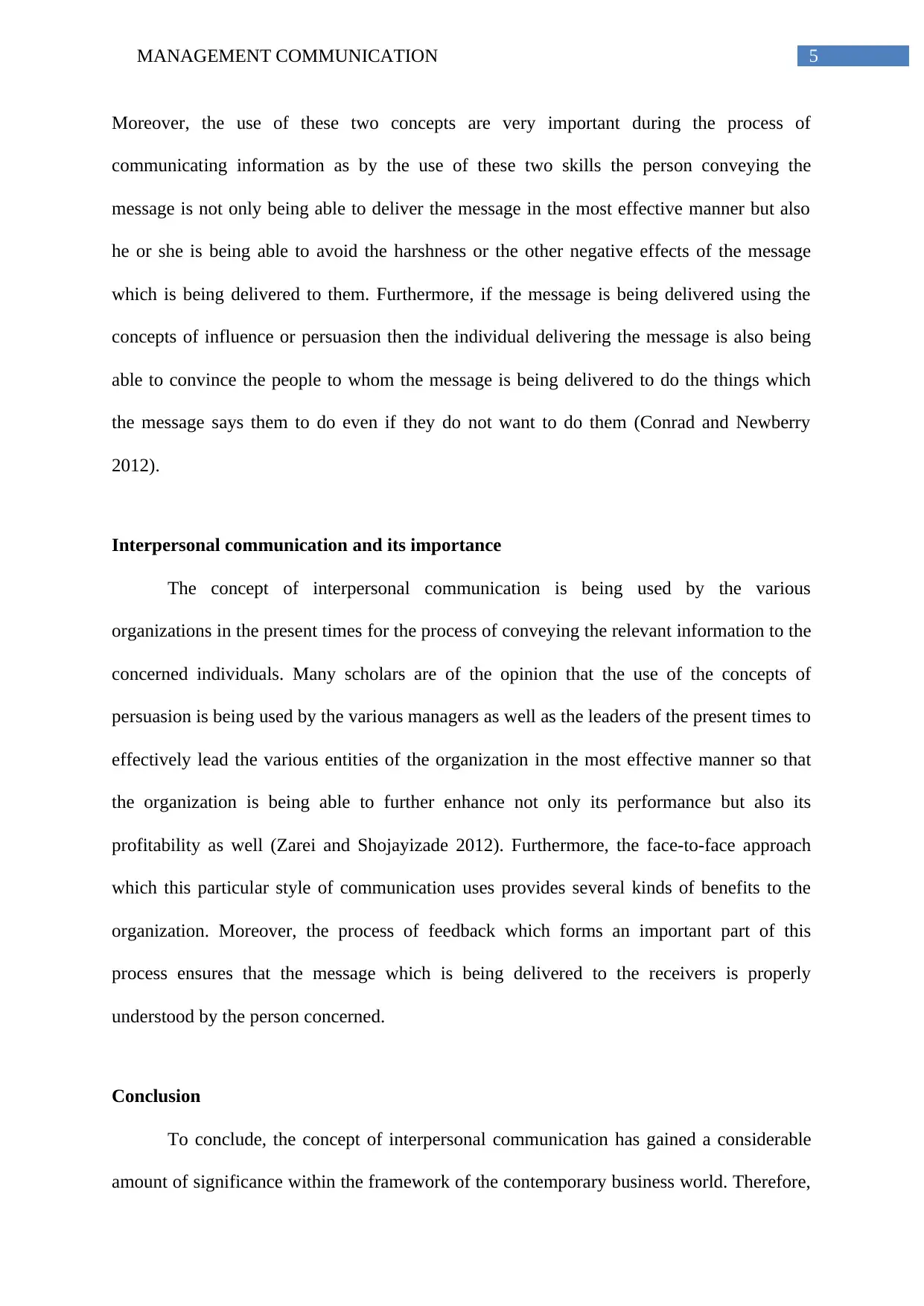
5MANAGEMENT COMMUNICATION
Moreover, the use of these two concepts are very important during the process of
communicating information as by the use of these two skills the person conveying the
message is not only being able to deliver the message in the most effective manner but also
he or she is being able to avoid the harshness or the other negative effects of the message
which is being delivered to them. Furthermore, if the message is being delivered using the
concepts of influence or persuasion then the individual delivering the message is also being
able to convince the people to whom the message is being delivered to do the things which
the message says them to do even if they do not want to do them (Conrad and Newberry
2012).
Interpersonal communication and its importance
The concept of interpersonal communication is being used by the various
organizations in the present times for the process of conveying the relevant information to the
concerned individuals. Many scholars are of the opinion that the use of the concepts of
persuasion is being used by the various managers as well as the leaders of the present times to
effectively lead the various entities of the organization in the most effective manner so that
the organization is being able to further enhance not only its performance but also its
profitability as well (Zarei and Shojayizade 2012). Furthermore, the face-to-face approach
which this particular style of communication uses provides several kinds of benefits to the
organization. Moreover, the process of feedback which forms an important part of this
process ensures that the message which is being delivered to the receivers is properly
understood by the person concerned.
Conclusion
To conclude, the concept of interpersonal communication has gained a considerable
amount of significance within the framework of the contemporary business world. Therefore,
Moreover, the use of these two concepts are very important during the process of
communicating information as by the use of these two skills the person conveying the
message is not only being able to deliver the message in the most effective manner but also
he or she is being able to avoid the harshness or the other negative effects of the message
which is being delivered to them. Furthermore, if the message is being delivered using the
concepts of influence or persuasion then the individual delivering the message is also being
able to convince the people to whom the message is being delivered to do the things which
the message says them to do even if they do not want to do them (Conrad and Newberry
2012).
Interpersonal communication and its importance
The concept of interpersonal communication is being used by the various
organizations in the present times for the process of conveying the relevant information to the
concerned individuals. Many scholars are of the opinion that the use of the concepts of
persuasion is being used by the various managers as well as the leaders of the present times to
effectively lead the various entities of the organization in the most effective manner so that
the organization is being able to further enhance not only its performance but also its
profitability as well (Zarei and Shojayizade 2012). Furthermore, the face-to-face approach
which this particular style of communication uses provides several kinds of benefits to the
organization. Moreover, the process of feedback which forms an important part of this
process ensures that the message which is being delivered to the receivers is properly
understood by the person concerned.
Conclusion
To conclude, the concept of interpersonal communication has gained a considerable
amount of significance within the framework of the contemporary business world. Therefore,
⊘ This is a preview!⊘
Do you want full access?
Subscribe today to unlock all pages.

Trusted by 1+ million students worldwide
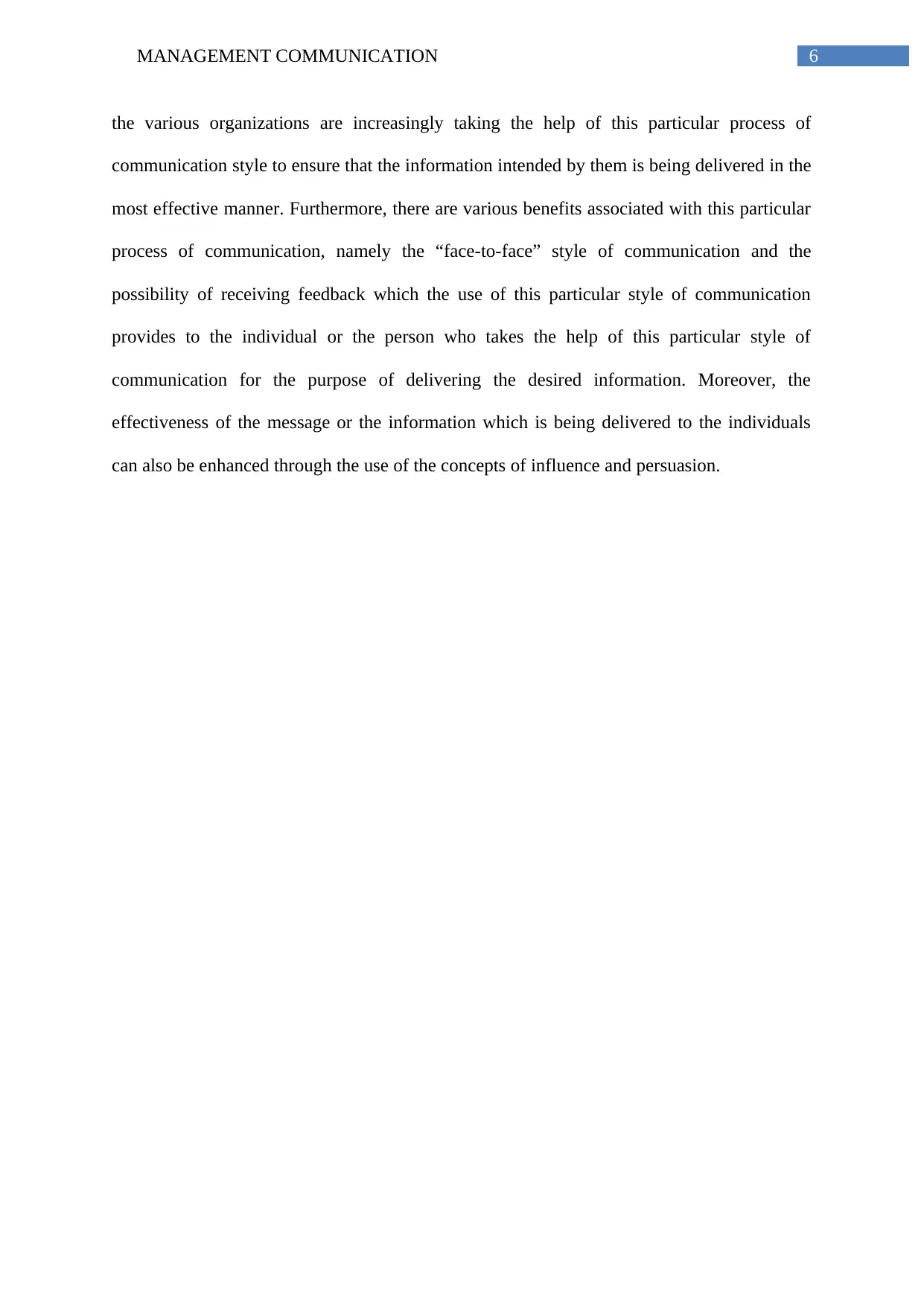
6MANAGEMENT COMMUNICATION
the various organizations are increasingly taking the help of this particular process of
communication style to ensure that the information intended by them is being delivered in the
most effective manner. Furthermore, there are various benefits associated with this particular
process of communication, namely the “face-to-face” style of communication and the
possibility of receiving feedback which the use of this particular style of communication
provides to the individual or the person who takes the help of this particular style of
communication for the purpose of delivering the desired information. Moreover, the
effectiveness of the message or the information which is being delivered to the individuals
can also be enhanced through the use of the concepts of influence and persuasion.
the various organizations are increasingly taking the help of this particular process of
communication style to ensure that the information intended by them is being delivered in the
most effective manner. Furthermore, there are various benefits associated with this particular
process of communication, namely the “face-to-face” style of communication and the
possibility of receiving feedback which the use of this particular style of communication
provides to the individual or the person who takes the help of this particular style of
communication for the purpose of delivering the desired information. Moreover, the
effectiveness of the message or the information which is being delivered to the individuals
can also be enhanced through the use of the concepts of influence and persuasion.
Paraphrase This Document
Need a fresh take? Get an instant paraphrase of this document with our AI Paraphraser
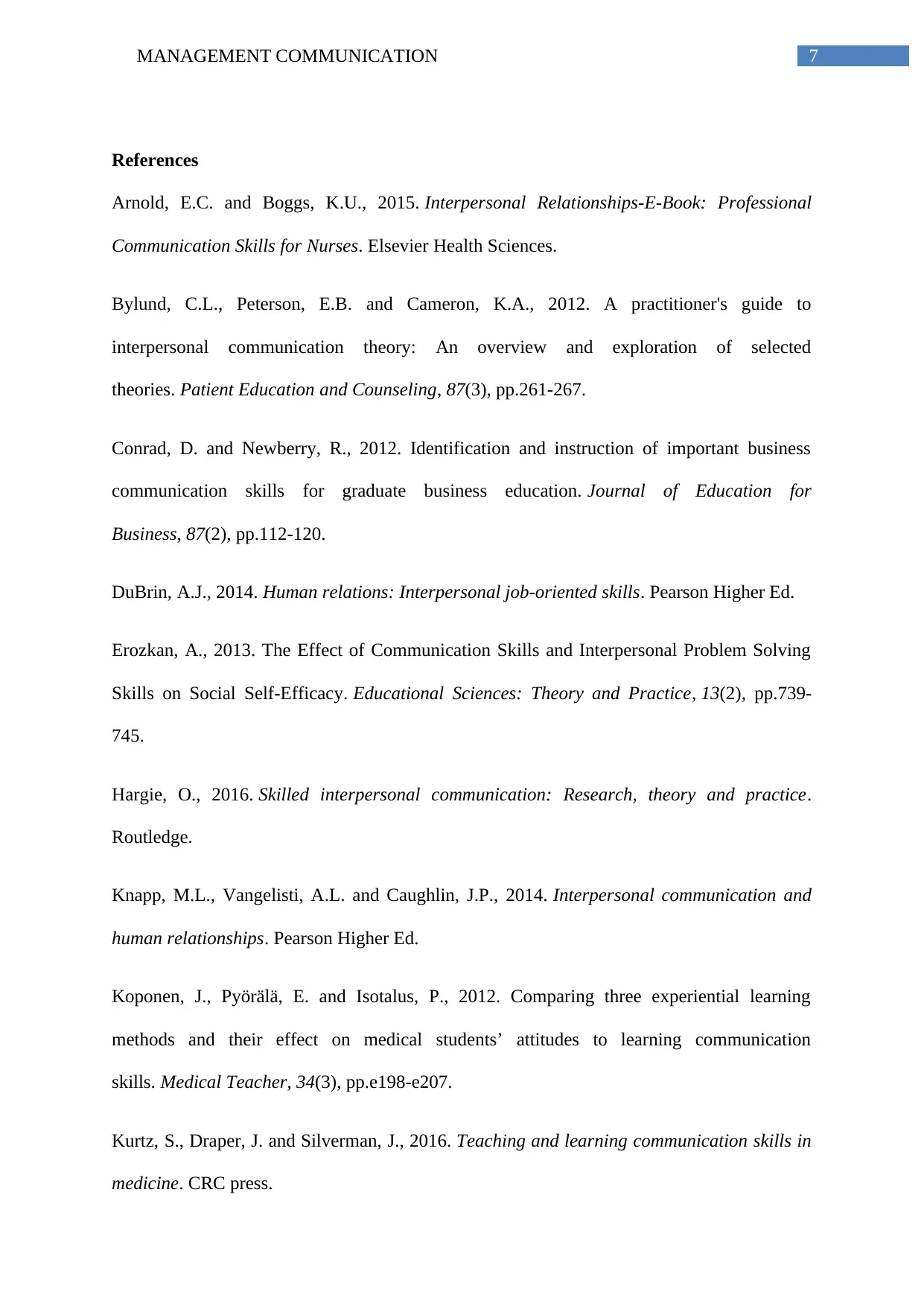
7MANAGEMENT COMMUNICATION
References
Arnold, E.C. and Boggs, K.U., 2015. Interpersonal Relationships-E-Book: Professional
Communication Skills for Nurses. Elsevier Health Sciences.
Bylund, C.L., Peterson, E.B. and Cameron, K.A., 2012. A practitioner's guide to
interpersonal communication theory: An overview and exploration of selected
theories. Patient Education and Counseling, 87(3), pp.261-267.
Conrad, D. and Newberry, R., 2012. Identification and instruction of important business
communication skills for graduate business education. Journal of Education for
Business, 87(2), pp.112-120.
DuBrin, A.J., 2014. Human relations: Interpersonal job-oriented skills. Pearson Higher Ed.
Erozkan, A., 2013. The Effect of Communication Skills and Interpersonal Problem Solving
Skills on Social Self-Efficacy. Educational Sciences: Theory and Practice, 13(2), pp.739-
745.
Hargie, O., 2016. Skilled interpersonal communication: Research, theory and practice.
Routledge.
Knapp, M.L., Vangelisti, A.L. and Caughlin, J.P., 2014. Interpersonal communication and
human relationships. Pearson Higher Ed.
Koponen, J., Pyörälä, E. and Isotalus, P., 2012. Comparing three experiential learning
methods and their effect on medical students’ attitudes to learning communication
skills. Medical Teacher, 34(3), pp.e198-e207.
Kurtz, S., Draper, J. and Silverman, J., 2016. Teaching and learning communication skills in
medicine. CRC press.
References
Arnold, E.C. and Boggs, K.U., 2015. Interpersonal Relationships-E-Book: Professional
Communication Skills for Nurses. Elsevier Health Sciences.
Bylund, C.L., Peterson, E.B. and Cameron, K.A., 2012. A practitioner's guide to
interpersonal communication theory: An overview and exploration of selected
theories. Patient Education and Counseling, 87(3), pp.261-267.
Conrad, D. and Newberry, R., 2012. Identification and instruction of important business
communication skills for graduate business education. Journal of Education for
Business, 87(2), pp.112-120.
DuBrin, A.J., 2014. Human relations: Interpersonal job-oriented skills. Pearson Higher Ed.
Erozkan, A., 2013. The Effect of Communication Skills and Interpersonal Problem Solving
Skills on Social Self-Efficacy. Educational Sciences: Theory and Practice, 13(2), pp.739-
745.
Hargie, O., 2016. Skilled interpersonal communication: Research, theory and practice.
Routledge.
Knapp, M.L., Vangelisti, A.L. and Caughlin, J.P., 2014. Interpersonal communication and
human relationships. Pearson Higher Ed.
Koponen, J., Pyörälä, E. and Isotalus, P., 2012. Comparing three experiential learning
methods and their effect on medical students’ attitudes to learning communication
skills. Medical Teacher, 34(3), pp.e198-e207.
Kurtz, S., Draper, J. and Silverman, J., 2016. Teaching and learning communication skills in
medicine. CRC press.

8MANAGEMENT COMMUNICATION
Petrovici, A. and Dobrescu, T., 2014. The role of emotional intelligence in building
interpersonal communication skills. Procedia-Social and Behavioral Sciences, 116, pp.1405-
1410.
Zarei, F. and Shojayizade, D., 2012. The effect of educational intervention based on
BASNEF model to improve interpersonal communication skills of nurses. Alborz University
Medical Journal, 1(3), pp.173-178.
Petrovici, A. and Dobrescu, T., 2014. The role of emotional intelligence in building
interpersonal communication skills. Procedia-Social and Behavioral Sciences, 116, pp.1405-
1410.
Zarei, F. and Shojayizade, D., 2012. The effect of educational intervention based on
BASNEF model to improve interpersonal communication skills of nurses. Alborz University
Medical Journal, 1(3), pp.173-178.
⊘ This is a preview!⊘
Do you want full access?
Subscribe today to unlock all pages.

Trusted by 1+ million students worldwide
1 out of 9
Related Documents
Your All-in-One AI-Powered Toolkit for Academic Success.
+13062052269
info@desklib.com
Available 24*7 on WhatsApp / Email
![[object Object]](/_next/static/media/star-bottom.7253800d.svg)
Unlock your academic potential
Copyright © 2020–2026 A2Z Services. All Rights Reserved. Developed and managed by ZUCOL.





